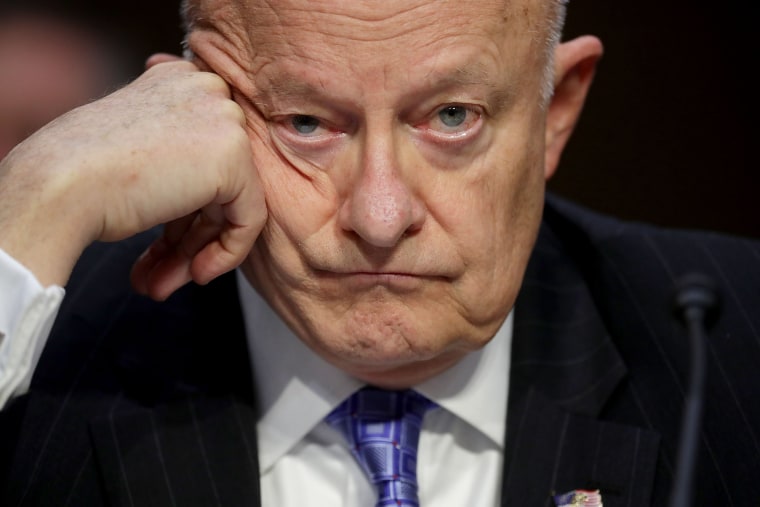WASHINGTON - After 50 years in government service, James Clapper is more apprehensive about the future of the country than ever before. That’s why he has written a new book, “Facts and Fears: Hard Truths From a Life in Intelligence.”
“I certainly had no intent whatsoever to write a book until what happened in the election viscerally disturbed me,” he told Chuck Todd this week in an in-depth interview for 1947: Meet the Press Podcast.
Clapper painted Russia’s interference as an ominous force in the 2016 election, and detailed its impact, including the subsequent investigation by Special Counsel Robert Mueller, which he described as a cloud over the country and over the presidency
“I’ve seen a lot of bad stuff in 50 years of intelligence, but nothing like this that I think attacked the very pillars of the foundation of this country,” Clapper said.
Clapper reaffirmed his evaluation that Russia’s activities tipped the election to Donald Trump.
“To me, it just stretches logic and credulity to ignore the elephant in the living room and suggest the Russians didn’t, not only impact the elections, but I think turned it,” he said.
He emphasized that the intelligence community had concerns, and was actively receiving intelligence, regarding meetings between the Trump campaign and Russians.
But according to Clapper, even as late as the inauguration of President Trump in January 2017, Obama administration officials didn’t know anything about the June 2016 Trump Tower meeting
“The dashboard warning light was certainly on, simply occasioned by what we did know about the frequency of meetings that various members of the Trump camp, whether in the campaign or out, were having with of all people, our primary adversary, the Russians,” he said.
He still won’t say with certainty whether or not he believes the Trump campaign colluded with Russia. He even briefed president-elect Trump once on Russia’s activities before the inauguration.
He said he hoped Robert Mueller and his team will issue a report about collusion “one way or the other.”
The conversation moved to former national security adviser Michael Flynn, whom Clapper described as “an angry man” following his ouster from the Defense Intelligence Agency in 2014 and decades of military service. “I think the termination ate at him,” he said.
After that, Flynn was ready to join with any Republican candidate “as long as he was in a position to criticize the Obama administration,” Clapper said.
It is commonplace for government officials to be approached by the GRU, Russia’s military intelligence agency, according to Clapper. He said that GRU officials approached him after his retirement from the agency in 1995, inviting him to their headquarters, and giving him a tour of a Spetsnaz facility.
Clapper said he tried to warn Flynn of getting to close with GRU officials.
“One time I had a little chat with him, sort of for some fatherly advice, to ‘just be careful,’” he said.
But Flynn, Clapper said, “may have succumbed” to GRU influence, leading to his appearance at the same table as Russian President Vladimir Putin at RT’s anniversary dinner in 2015.
Todd also asked Clapper about deep concerns he expressed in the final chapter of “Facts and Fears” for America’s future.
“We’re a fork in the road. What fork are you worried that we may take?” Todd asked. “I don’t know,” Clapper said.
“All I say in the end of the book is we’ve emerged from traumas before, notably the Civil War, and the trauma I lived through, the Vietnam War, and in the end, we emerged the better and the stronger force for it, but it took time. and we’re still recovering in some sense from both those traumas.”
“I’m with you, in that we always seem to get out of these dark periods,” Todd said. “But then I‘ve had people say to me, “What do you think the average German thought in 1930?”
“Well same thing,” Clapper said. “That’s what makes me apprehensive, and makes me worry.”
